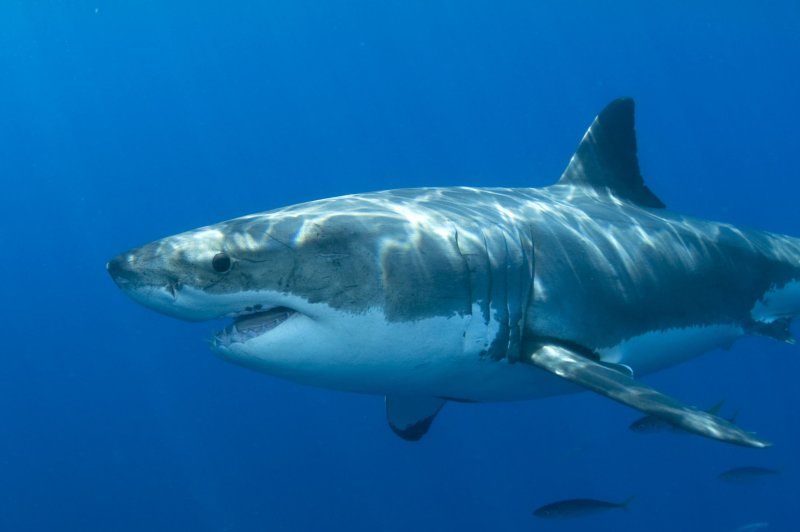A Great White is observed during behavioral research studies being conducted on Great White Sharks off of Isla Guadalupe, Mexico on September 15, 2008. Club Cantamar, primarily a tour operator has branched into conducting coordinated research with Isla Guadalupe Conservation to protect the species of sharks while offering tourists to Mexico the ability to also observe the sharks as they migrate through the area. The Conservation agency reports its findings to the Mexican Government which maintains authority on granting this activity. (UPI Photo/Joe Marino) |
License Photo
BARNSTABLE, Mass., May 6 (UPI) -- More than 415,000 brochures meant to inform residents and visitors about sharks in the water -- and to educate readers on what to do should they spot one -- have been printed and distributed throughout Cape Cod.
But some locals worry the brochure is bound to breed hysteria and scare off tourists, not educate the public.
Richard Delaney, president of the Center for Coastal Studies in Provincetown, acknowledges that the brochure features some useful information, but said the overall tone and imagery reminds him of the Blockbuster thriller "Jaws."
"The cover has an extra-mean, toothy picture of a shark," Delaney said. "It's one more example of how we, as a society, have this general myth that these guys are big, nasty creatures."
The outreach effort is being executed by a group of harbormasters, local officials, and other nonprofit groups in Massachusetts; it's supported by a $22,500 grant from a state program.
"We're just trying to raise public awareness," explained Nathan Sears, a natural resources manager for Orleans, one of the campaign groups. "It's the reality of what's happening in our ocean at the moment. From a management perspective, making the public aware of the situation is our biggest tool."
"I'm not a biologist, but from what I understand, this is a hot spot for these animals," Sears added. "They're going to continue coming to these places."
But critics say Sears and campaign supporters are walking a fine line.
"The reality is, we have sharks, and there has to be some public information campaign," said Wendy Northcross, the head of the Cape Cod Chamber of Commerce. "On the flip side, there's concern that sharks will be sensationalized or people will want to go on shark hunts."















